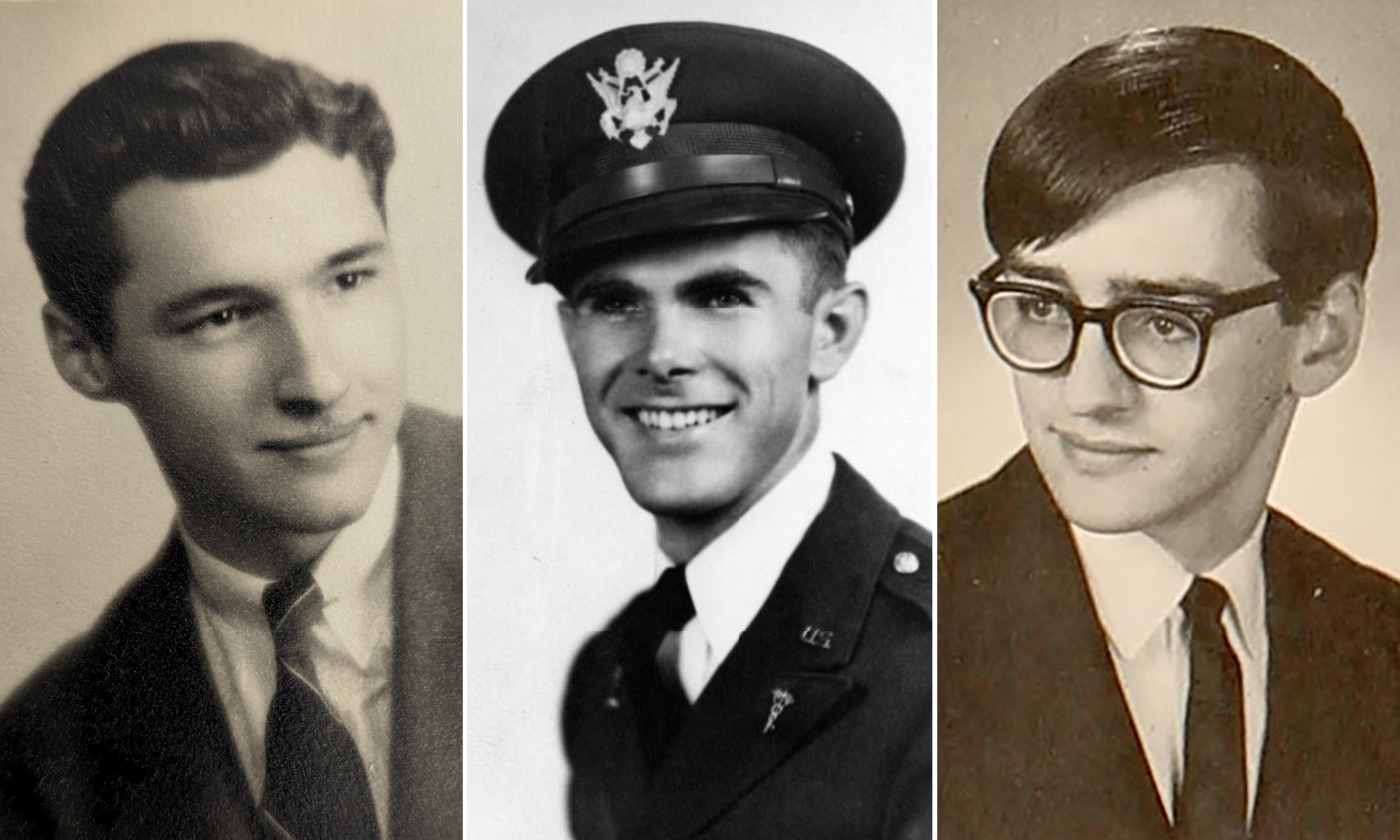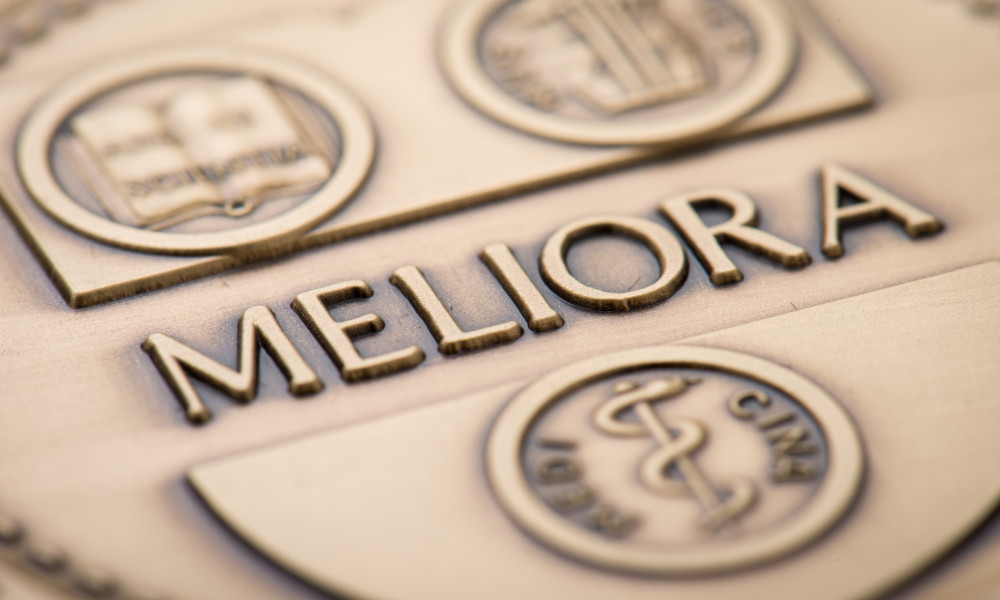Maisha Idris ’19 dreamed of attending college as a child, despite long odds. Her parents were immigrants from Bangladesh who settled in New York City. Neither graduated from high school. Both worked low-paying jobs.
“I was fortunate to have teachers who emphasized the importance of a college degree, and my parents were very supportive,” Idris says. “I grew up feeling I would go to college, no matter what.”
Valedictorian of her high school class in Queens, Idris was accepted at Rochester. Through scholarships and financial aid, she was able to enroll. But her first year was difficult.
“I was confused about how to utilize all of the resources available to me and embarrassed about my background,” says the computer science major. “I regretted coming to college every day.”
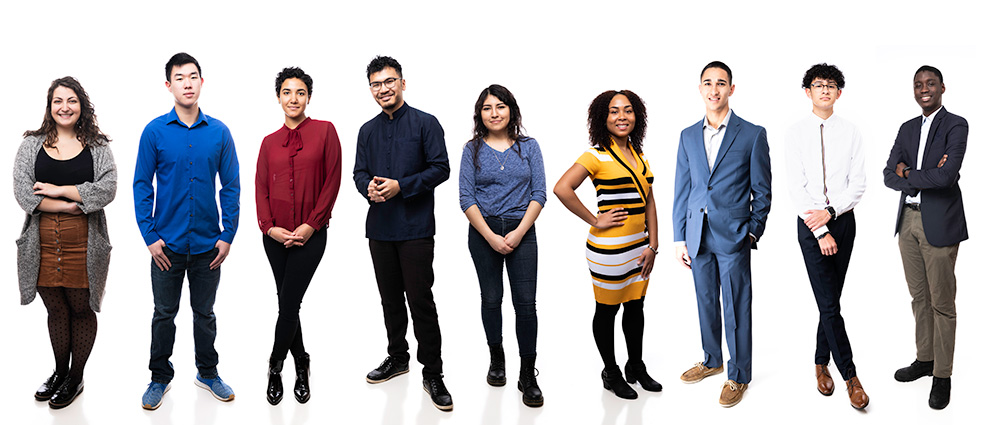
(University of Rochester photos / J. Adam Fenster)
The David T. Kearns Center, the University’s academic home for first-generation students, was a game changer for Idris. She met regularly with an advisor who made sure her studies were on track. She was introduced to the Center for Excellence in Teaching and Learning and learned better study skills.
“I went from feeling isolated to knowing there were people on campus dedicated to the success of students like me,” Idris says. “I finally felt I belonged.”
Last August, she received an Edmund A. Hajim Endowed Scholarship. Established by board chair emeritus Ed Hajim ’58, the scholarship is awarded to two engineering students per class who exhibit “academic strength, intellectual promise and innovative thinking.” She’s set to graduate in May and has a job offer in hand as a software engineer for Raytheon.
SHARING THEIR STORY
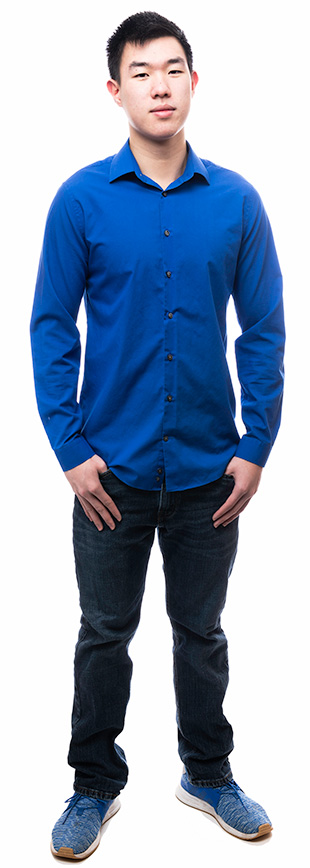
Michael Lin ’21
MAJOR Creative writing, business
SCHOLARSHIP Alan and Jane Handler Endowed Scholarship
Two months before Michael Lin ’21 was born, his family moved from China to Queens. When Lin was in the sixth grade, his father died, leaving his mother to support the family with a factory job. Lin was determined to enroll in college, but worried about the cost.
The Alan and Jane Handler Endowed Scholarship, established by University Board Chair Richard Handler ’83 and his wife, Martha, erased those fears. The University’s leading award, its benefits include financial support, individual mentorship, and access to previous Handler Scholars. “It was a blessing,” Lin says. He struggled his first year but befriended fellow students in Tiernan Hall and resident advisors who became mentors. He joined Sigma Chi fraternity and UR Photography.
He also is helping future first-generation students apply to college—a process he found “confusing and stressful.” He proposed a mentoring program involving Handler Scholars at East High School—part of the Rochester City School District, but managed in partnership with the University. Superintendent Shaun Nelms ’13W (EdD), who also teaches at the Warner School, accepted the idea, and the Handler Scholars are now part of East’s Step to College program, offering advice and hosting students on the River Campus.
Idris’s story is striking, but not unusual at Rochester, where about 20 percent of undergraduates are first-generation, or “first-gen” students—those whose parents didn’t attend college. Several departments provide resources to help such students transition into college life, and a student organization offering peer-to-peer support to first-generation students was created last spring. Many students are aided by scholarships that lift the financial barriers that would otherwise prevent them from attending college.
“We are committed to the success of our first-generation student population,” says Jeffrey Runner, dean of the College.
SHARING THEIR STORY

Marines Espinal ’21
MAJORS Environmental science, American Sign Language
SCHOLARSHIP Prudence K. Bradley Endowed Scholarship
When Marines Espinal ’21 moved from the Dominican Republic to New York City at age 10, she realized she had “the opportunity of a lifetime” awaiting her. “I became really passionate about education,” she says. “I wanted to make my mom proud and be able to provide for her in the future.”
Espinal enrolled in Rochester’s Early Connection Opportunity, a summer program that prepares first-year students for the academic and social challenges of college. “Entering college as a first-generation student was really intimidating,” she says. “ECO helped me get to know the campus and the resources I could use.”
She joined the dance group Ma’Frisah and found her “home on campus” at the Office of Minority Student Affairs. “Whenever I’m down, I know I can go there and see faces that will brighten my day and give me hope and motivation,” she says. Espinal plans to pursue a master’s degree leading to work that will better the environment.
According to Maureen Hoyler, president of the Council for Opportunity in Education in Washington, D.C., Rochester has a distinguished record among elite private universities in supporting low-income and first-generation students. In 1965, passage of the landmark Higher Education Act led to the creation of the federal TRIO programs—outreach and student services programs funded by the US Department of Education to provide help for students from disadvantaged backgrounds. Rochester has played “a critical leadership role” in TRIO, says Hoyler.
“The University has long recognized the need to provide comprehensive services to low-income and first-generation students. Its graduation rates are exceptional, and its record in preparing students in STEM (science, technology, engineering, and math) may be unmatched.”
Jonathan Burdick, vice provost for enrollment initiatives and dean of Admissions and Financial Aid, has a message for first-generation students.
“You’re not here based on some quota,” he says. “We turned thousands of applicants down. You’re here because you deserve to be here.”
SHARING THEIR STORY

Pech Chhun ’19
MAJORS Clinical psychology, biology
SCHOLARSHIP W. H. Brady Student Support Fund
Pech Chhun ’19 didn’t speak English when he left Cambodia for Rochester with his mother and sister at age eight—but college was part of the plan, if the financial resources were there. He enrolled in an International Baccalaureate program in high school and was named a Brady Scholar in recognition of his engagement in the Early Connection Opportunity program.
“I struggled my first year at Rochester,” he says. “The traits I had learned, being independent and self-sufficient, had to be unlearned so that I could use campus resources that could help me. It took about two years.”
Chhun became a resident advisor, a D’Lion, and a member of Debate Union. He also founded the student organization First Gen Society and serves as president. “I’m so proud of it,” he says. “I hope it serves students well for many years after I’m gone from the University.” Chhun will graduate in May. His sister, Pechrasmey, received her degree from the School of Nursing in December.
Last fall, 22 percent of the members of the incoming class were first-generation students, the highest percentage in years. Burdick sees attracting and graduating first-generation students as a central part of the College’s mission.
“We’re not here to be a final line on a student’s glowing resume,” he says. “We’re here to be an engine of transformation for society. First-generation students need that more than anybody else.”
Few first-generation students can enroll at Rochester without financial support. According to a 2017 report from Insider Higher Ed, 27 percent of first-generation college students come from households making $20,000 or less. The University provides around $65 million annually in grants and scholarship to low-income undergraduates in Arts, Sciences & Engineering, opening doors that otherwise would remain closed.
SHARING THEIR STORY

Dulce Martinez Alarcon ’22
MAJOR Undecided
SCHOLARSHIP Robert and Ellen Kirschenbaum Term Scholarship
In some respects, Dulce Martinez Alarcon ’22 had a typical first day of college.
“I didn’t know anyone,” says the Mexico native, who moved to Arizona with her family at age three. “I realized how far from home I was. It was a tough day.” But as the first person in her family to go to college, Martinez, whose academic interests include business, psychology, and philosophy, felt she had to carry an extra burden. “I had to figure everything out for myself,” she says. It got better as she “started finding people I could relate to and made friends. And I saw all of the help available on campus.”
She became a Kearns Scholar, joined SALSITA (Spanish and Latino Students in Training for Awareness), and signed up for the First Gen Society club. “Those clubs gave me an opportunity to meet people like me,” she says.
The Kirschenbaum Scholarship, established by Robert ’70 and Ellen Kirschenbaum, supports undergraduates in the School of Arts &Sciences, with a preference for need-based students from Arizona. “It’s the reason I’m here,” she says. Martinez aspires to a career in law.
At the same time, financial support alone is often not enough for first-generation students to make the most of their potential. In an age when affluent parents are increasingly tapping into their means and experience to help their children prepare for and navigate higher education, colleges and universities must have resources to offer similar support for students without those benefits.
In 2018, a $5 million gift from Kenneth French ’78S (MBA), ’83S (PhD) and his wife, Vickie, came out of a recognition of the importance of academic, as well as financial, support. The couple established the KRFrench Family Scholars Program to provide financial aid and a robust network of academic support for College undergraduates with high academic potential and financial need.
Although French wasn’t a first-generation student himself, he calls his time at Rochester “transformative.” “I was an engineer at Eastman Kodak after receiving my bachelor’s degree. I went to Rochester to get my MBA, and because of the excellent teaching I received, I discovered the excitement and vibrancy of economics and finance and decided to get my PhD. It’s been my life ever since.”
SHARING THEIR STORY

Alejandro Vera ’22
MAJOR Biology
SCHOLARSHIP Roger Birnbaum Family Scholarship for the Kearns Center Scholars Program
When Alejandro Vera ’22 moved across the country last August to begin college, he felt “a combination of excitement and pure fear and anxiety.”
“Lost doesn’t begin to describe how I felt,” he says. “Everybody seemed to know where to go and how to get there.” His worries dissipated when he joined the First Gen Society, a student organization offering peer support to first-generation students. He was introduced to the Office of Minority Student Affairs and the David T. Kearns Center and went from feeling like an outsider to a member of the community.
“UR has quickly felt more and more like my home,” he says. “I’ve found the right people to surround myself with and have become more comfortable with the campus and the city.” After graduating, Vera plans to take a gap year to gain experience and work toward getting into medical school. His career goal is to become an OB/GYN. “I’m fascinated by the idea of helping to bring life into this world,” he says.
The Roth Family Distinguished Professor of Finance at Dartmouth College’s Tuck School of Business since 2011, French is also a consultant to Dimensional Fund Advisors, a global investment firm, and a member of its board of directors. “First-generation students are special to Vickie and me,” French says. “These are students with great strengths and qualifications. With a little assist, we can put that human capital to work.”
The Frenches will add significantly to a network of resources the College already has in place to serve first-generation students. Those resources lend confidence to other scholarship benefactors that their investment at Rochester will be a good one.
Roger Birnbaum ’58 attended Rochester with his twin, Robert Birnbaum ’58, and graduated with a degree in business. Since 1991, he has been president of the Princeton Healthcare Group. Concerns about the rising costs of higher education, combined with income and wealth inequality, prompted him in 2014 to establish the Roger Birnbaum Family Scholarship for the Kearns Center Scholars Program, awarded to students who are low-income, first-generation, or underrepresented minorities
SHARING THEIR STORY

Anna Gasanova ’20E
MAJOR Viola performance
SCHOLARSHIP Karen Noble Hanson Scholarship Fund in Memory of Kathryn Cromwell Noble and Joseph L. Noble, Anne M. Braxton Scholarship Endowment
Anna Gasanova ’20E began playing the viola at age nine and spent her final two years of high school at the University of North Carolina’s School of the Arts. “It gave me a pretty good grasp on dorm life, so I wasn’t that nervous about coming to Eastman,” she says.
Her parents emigrated from the former Soviet Union, and her father died when she was four. She relied on close family friends, books, and movies to give her a sense of what to expect from college life.
“Eastman was my dream school, and I was really excited about coming here,” she says. “It’s incredibly intense as far as academics go. It really teaches you to be a well-rounded musician.”
The Noble Hanson Scholarship Fund for Eastman students was established in 1993 by Karen Noble Hanson ’70, a life trustee who died last November. The Anne M. Braxton Scholarship Endowment was established in 2010 by her estate. “It takes away the worry and struggle and makes your dreams come true,” says Gasanova.
“We’re losing a whole generation of kids who have all this potential but are being priced out of the higher education market,” he says. “Some of these kids are fortunate enough to get scholarships and financial aid but aren’t prepared socially. They can drown in school. The Kearns Center embraces these kids and provides the support that can make the difference between success and failure.”
Prudence Bradley ’88 (PhD) was a first-generation student who had a successful career in pharmaceutical research and development. She established the Prudence K. Bradley Endowed Scholarship for first-generation Rochester students with financial need with a preference for students pursuing degrees in STEM fields. Bradley recipient Marines Espinal ’21, an environmental science and American Sign Language double major who moved from the Dominican Republic to New York City when she was 10, was able to get a head start at Rochester through the Early Connection Opportunity program overseen by the College’s Office of Minority Student Affairs.
“Without the Bradley Scholarship, I wouldn’t have been able to attend Rochester,” she says. “I’m grateful and blessed.”
SHARING THEIR STORY

Mouhamed Diakhate ’22
MAJOR Brain and cognitive sciences
SCHOLARSHIP KRFrench Family Scholars Program
Mouhamed Diakhate ’22 calls the KRFrench Family Scholars Program a “blessing.” Established last year by Kenneth French ’78S (MBA), ’83S (PhD) and his wife, Vickie, it benefits students with high academic potential and demonstrated financial need.
“My parents aren’t US citizens, and I was under 18, so taking out a loan wasn’t an option,” he says. “The scholarship made everything possible.”
Diakhate moved back to Manhattan three years ago and attended Boys Hope Girls Hope, a college-preparatory program that operates internationally. That helped in his transition to college, but it was still stressful. “I was entering a new chapter in my life,” he says. “My RA, D’Lion, and resident fellow made sure I was where I needed to be the first few weeks and made me feel welcome here. And I discovered student clubs which made me feel I belonged.”
Diakhate hopes to join the Black Students’ Union, Pan-African Students Association, and the Minority Male Leadership Association.
Adjusting to college can be challenging for any student, and to some extent, the growth of services targeted at first-generation students is part of a larger expansion of academic and other types of supports for all students that’s now almost universal in higher education. But at elite private universities such as Rochester, first-generation students are especially vulnerable to feelings of isolation. Sometimes, they feel misunderstood by classmates from more affluent backgrounds.
“There’s sometimes an assumption that first-generation students are only [members of underrepresented minority groups], or that they’re not bright,” says Dawn Bruner, director of the Office of Parent and Family Relations. “That’s not true. They’re diverse, intelligent, and engaged students who have worked hard to be here.”
Once a first-generation student herself, Bruner says first-generation students often believe they’re the only ones having difficulty at school. “In reality,” she says, “every student struggles at some point.”
SHARING THEIR STORY

Majd Ismail ’21
Major Biomedical engineering
Scholarship Edmund A. Hajim Endowed Scholarship
Majd Ismail ’21 felt “lost” when he started college. “I worried I wouldn’t make friends,” he says. “I worried about balancing everything while being on my own and felt pressure to live up to my parents’ expectations.”
His resident advisor, Garret Gay ’18 helped put him at ease. “He reassured me that everything would work out, and I’d eventually feel more comfortable at college,” Ismail says. “And he was right.”
Ismail discovered study groups at the Center for Excellence in Teaching and Learning which allowed him to manage his workload. He also joined the Sigma Chi fraternity. “It became my home away from home,” he says. “It surrounded me with friends I knew would do anything to help me.”
Being a Hajim Scholar has allowed him to focus on school, rather than stress about finances. “It’s allowed me to connect with people I otherwise would never have met,” he says. Ismail wants to continue his education in graduate school and eventually work with prosthetics, in the industrial or research fields.
In spring 2018, Pech Chhun ’19 created a new student organization, the First Gen Society, offering first-generation students peer-to-peer support. “We thought it was important to have a group where first-generation students could relate to and support each other,” says Chhun, a clinical psychology and biology double major who moved from Cambodia to Rochester when he was eight. Chhun is a Brady Scholar, a scholarship program established by University Trustee Elizabeth Pungello Bruno ’89.
Weekly meetings alternate between educational seminars on topics such as how to write a résumé to social events, such as painting pumpkins and a “Friendsgiving” feast.
Society member Scott Saucier ’19, an economics and political science double major from Wolcott, Connecticut, says his struggles were more social than academic his first year. “I had trouble making friends,” he says. Saucier, a beneficiary of the Schiff Family Scholarship Fund, established with an estate gift from Hans ’43 and Merle Schiff, stresses the importance of getting involved. He found a friend group with the Baja SAE team and added roles as an RA, as a first-year fellow, and with orientation. “Gradually, I started to find my way here.”
Another member, Allison Morningstar ’19, was valedictorian at her high school in York, Pennsylvania, but recalls how defeated she felt after her first midterm exams. The neuroscience major found a spot behind the Interfaith Chapel and called her mother in tears, telling her, “I shouldn’t be here. If I can’t do well at these things, how will I succeed at anything else?”
SHARING THEIR STORY
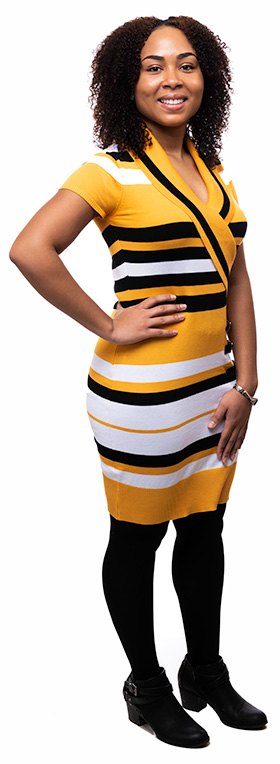
Seyvion Scott ’19
Major African and African-American studies
Scholarship Cathy E. Minehan and E. Gerald Corrigan Endowed Scholarship
The first days at Rochester were difficult for Seyvion Scott ’19, who had no one to guide her. “I was able to meet the academic rigor,” she says, “but the culture shock took hold of me and made me feel inadequate.”
It was during that challenging first year that she discovered the Frederick Douglass Institute, established in 1986 to promote the development of African and African-American studies. “FDI became a safe haven for me,” she says. “It was a space where I could earn money, chat about my experiences, and feel comfortable in my own skin.”
Scott joined the Black Students’ Union and was an Urban Fellow for the Rochester Center for Community Leadership. She maintained a local children’s garden and helped register city residents to vote. In 2017, the Susan B. Anthony Center awarded her the Dean Ruth A. Merrill Award, given to an undergraduate woman from Rochester who advocates for the region and participates in University and community activities that promote the well-being of Rochester residents.
Scott plans to earn a master’s degree in library science.
The tide turned when she was awarded the Carolyn E. and Jeffrey A. Stone MD Current Use Undergraduate Scholarship, established by Jeffrey Stone ’87, ’91M (MD) and Carolyn Stone ’87. “It showed me there are people who believe in me,” Morningstar says. She became a Kearns Scholar, then a research assistant at the Medical Center. Last spring, she was one of 13 Rochester students elected to the Phi Beta Kappa honor society as a junior.
Last year, Chhun was speaking to students from the Rochester City School District about the importance of higher education when one of the students expressed his disdain for college. Chhun was taken aback but chatted with the student about the importance of a degree.
“Many students who don’t have a college background in their family see it as a big bill, something completely irrelevant in their life,” he says. “I think it’s a misconception. If a student wants to go to college, there are people who will move mountains for you to go and thrive in college. I’ve seen it here at the University. I’m proof of it.”
STUDENT SUPPORT
Campus programs and organizations reach out to first-generation students
The Office of Minority Student Affairs has supported the needs of underrepresented and first-generation students for 50 years. Through the Higher Education Opportunity Program and the Early Connection Opportunity program, OMSA introduces first-generation students to college through social events, seminars, and introductory courses, and partners with University departments to provide help with writing, study skills, and leadership training.
“It’s critically important that we provide the type of support that helps first-generation students realize their academic and personal goals,” OMSA Director Norman Burnett says.
The David T. Kearns Center has worked with first-generation students since 1992, when the University received its first federal funding for the Ronald E. McNair Post-Baccalaureate Achievement Program. The center is also home to other federal initiatives, including Upward Bound programs and the Talent Search, that often serve first-generation students. Melissa Raucci, first-generation coordinator, says 80 percent of the 119 Kearns Scholars enrolled in the fall 2018 semester were first-generation students. In addition to having access to study groups, workshops, and career mentoring, Kearns Scholars enroll in a one-credit course called Navigating the Academy. Three-fourths of Kearns Scholars go on to graduate school.
The Office of Parent and Family Relations and the First-Generation Students and Families Committee host an orientation event each summer and created a website for families. In 2018, Parent and Family Relations initiated a program called Family Talk, where students chat in small groups with staff members from Parent and Family Relations and the University Counseling Center about concerns they might not be able to discuss at home.
“We create a space for students to identify with each other and give them strategies for how they can have those difficult conversations,” says Parent and Family Relations Director Dawn Bruner, who was once a first-generation student herself.
The First-Generation Students and Families Committee also sponsors a senior celebration for first-generation students, initiated the addition of the Gwen M. Greene First-Generation Senior Award as part of the Dean of Student’s Student Life Awards, and developed 1ST ONE, a campus community campaign to show support for first-generation students at Rochester.
The First Gen Society, established in 2018, offers peer-to-peer support through weekly meetings alternating between educational seminars on topics such as how to write a resume, as well as social events, such as painting pumpkins and a “Friendsgiving” feast.



